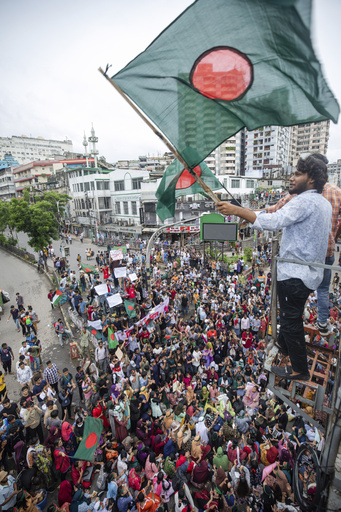In Bangladesh’s capital, Dhaka, a large crowd of people from various backgrounds gathered to seek justice for over 200 students and others who lost their lives during a recent surge of violence linked to demonstrations against a controversial quota system for government jobs. The protesters joined together in chanting anti-government slogans like “Justice, Justice, We want justice” and “Resignation, resignation, Sheikh Hasina’s resignation,” with the protests expanding beyond just students to include parents, doctors, and teachers rallying in different parts of the city.
The demonstration was peaceful as groups moved towards the central Shaheed Minar, a monument commemorating those who died in 1952 while protesting for Bengali to be recognized as a state language during the period when Bangladesh was part of Pakistan. Prime Minister Sheikh Hasina expressed willingness to engage in dialogue with student leaders on Saturday, however, a coordinator rejected the offer through a Facebook post, emphasizing that it was inappropriate to seek justice from a government seen as responsible for the tragedy.
The initial peaceful protests turned violent when clashes erupted between students at Dhaka University and police as well as activists from the student wing of the ruling Awami League party on July 15. The violence led to the loss of over 200 lives and injuries to thousands, sparking widespread condemnation. In response, schools and universities were closed nationwide, the internet was shut down, and a shoot-on-sight curfew was imposed by authorities to curb the unrest.
The ongoing demonstrations present a significant challenge for Prime Minister Hasina, who secured a fourth consecutive term in January amid an election that was boycotted by major opposition parties. The students’ main demand was the abolition of the quota system for government jobs, alleging discrimination as it reserved 30% of positions for families of veterans who participated in Bangladesh’s war of independence in 1971. Protesters argued that the quota system favored supporters of Hasina and her Awami League party, who played a key role in the country’s independence movement under Hasina’s father, Sheikh Mujibur Rahman.
Despite a reduction in the veterans’ quota from 30% to 5% by the Supreme Court on July 21 in response to the protests, demonstrations have persisted due to continued anger over the violent crackdown. Among the students’ nine-point list of demands are a public apology from Prime Minister Hasina and the release of all detained students. While internet services have been restored and normal business operations have resumed, tensions remain high in the country.
This website uses cookies so that we can provide you with the best user experience possible. Cookie information is stored in your browser and performs functions such as recognising you when you return to our website and helping our team to understand which sections of the website you find most interesting and useful.
